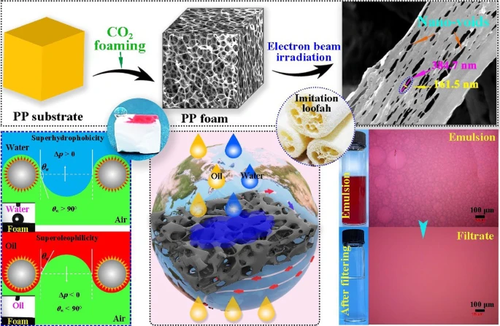A scalable versatile methodology to construct micro/nano open-cell polypropylene foam with high oil adsorption capacity and speed
Abstract :Oil pollution is a serious environmental and natural resource problem. Traditional adsorption materials for oil-water separation have limitations in terms of their preparation cost, reusability, and mechanical properties. Among the conventional adsorption materials, super-hydrophobic/super-lipophilic materials are easily contaminated by oil. In this study, polypropylene (PP) is used as a foam substrate to prepare an open-cell PP foam via hot pressing, supercritical CO2 foaming, and electron beam (EB) irradiation. The impact of EB irradiation dose on the open-cell content of PP foam can lead to cell wall rupture, resulting in an open-cell structure that enhances oil-water separation performance. At an absorbed radiation dose of 200 kGy, the PP foams exhibit optimal oil–water separation performance, cyclic compression stability, heat insulation, and preparation cost. The open-cell content of PP foam is increased to 86.5%, the adsorption capacity for diesel oil is 42.8 g/g, and the adsorption efficiency remains at 99.6% after 100 cycles of oil desorption in a complex pH environment. Meanwhile, cracks and nano-voids simultaneously promote the capillary action of oil, and the oil transport rate is 0.0713 g/(g·s). This study provides a new concept for the preparation of open-cell polymer foams that can meet the demand for high oil-absorption capacity under complex acid-base pH conditions.

Yang C, Tao D, Yan K, et al. A scalable versatile methodology to construct micro/nano open-cell polypropylene foam with high oil adsorption capacity and speed. Nano Research, 2023: 1-10.